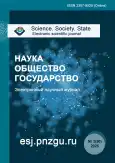Activities of foreign intelligence services as a threat to national mentality: philosophical approach
- Authors: Kovalev A.A.1
-
Affiliations:
- North-western Institute of Management, branch of the Russian Presidential Academy of National Economy and Public Administration,
- Issue: No 2 (2025)
- Pages: 140-150
- Section: PHILOSOPHICAL ANTHROPOLOGY, PHILOSOPHY OF CULTURE
- URL: https://journal-vniispk.ru/2307-9525/article/view/301354
- DOI: https://doi.org/10.21685/2307-9525-2025-13-2-14
- ID: 301354
Cite item
Full Text
Abstract
Background. The dialogue of cultures, which has become a consequence of the growing globalization processes of recent decades, has now led to the opposite effect. As a result, nation-states faced an urgent need to protect their mental space from outside interference. The purpose of the study is to identify the relationship between the activities of foreign intelligence agencies and the negative impact on the national mentality and to reveal ways to counter this phenomenon. Materials and methods. The present study was based on a mental approach. Its application made it possible to study the state and the people not only as an object of political, sociological or legal research, but also philosophical. The descriptive method and the method of historical analysis were also used. Results. The interrelation of such phenomena as the negative impact on the national mentality and the activities of foreign intelligence services is revealed. Different directions of combating the identified threat are considered: legal, informational, psychological, educational, etc. The potential of man and the state as subjects of the struggle for mental space is studied. Conclusions. Modern society needs security more than ever before. At the same time, a sense of security often becomes even more significant and preferable than knowledge of specific steps and results to ensure security, which remain under the jurisdiction of the State. A person is vulnerable to covert attacks on his mental space, therefore, a demonstration by the state of interest in his protection and a public expression of trust in the government can give positive results in combating the influence of foreign intelligence services on the national mentality.
About the authors
Andrey A. Kovalev
North-western Institute of Management, branch of the Russian Presidential Academy of National Economy and Public Administration,
Author for correspondence.
Email: kovalev-aa@ranepa.ru
Candidate of Political Sciences, Associate Professor, Associate Professor of the Department of State and Municipal Management
57/43 Sredny prospekt V.O., St. Petersburg, 199178References
- Polezhaev D.V. Philosophical foundations of national identity. Sibirsky uchitel’ = Siberian Teacher. 2017;(2):60–67. (In Russ.)
- Potapov V.V. Institute of Public Confidence in the Ministry of Internal Affairs. Etnosotsium i mezhnatsional'naya kul'tura = Ethnosocium and interethnic culture. 2014;(1):49. (In Russ.)
- Febvre L. Boi za istoriyu = Battles for history. Moscow: Nauka, 1991:629. (In Russ.)
- Bloch M. Apologiya istorii, ili Remeslo istorika = The Apology of history, or the craft of the historian. Moscow: Nauka, 1986:254. (In Russ.)
- Shenkao M.A. Study of mentalities in the French Annales school. Obshchestvo. Sreda. Razvitie = Society. Environment. Development. 2009;(1):60–72. (In Russ.)
- Lotman Yu.M. Kul'tura i vzryv = Culture and explosion. Moscow: Gnozis; Progress Publishing Group, 1992:270. (In Russ.)
- Lektorsky V.A. Filosofiya, poznanie, kul'tura = Philosophy, cognition, culture. Moscow: Kanon+, 2012:383. (In Russ.)
- Panarin A.S. Rossiya v tsiklakh mirovoy istorii = Russia in the cycles of world history. Moscow: Moscow University Press, 1999:280. (In Russ.)
- Dugin A.G. Conceptual approaches to the notion of “civilization”. Vestnik Moskovskogo universiteta. Seriya 18. Sotsiologiya i politologiya = Moscow University Bulletin. Series 18. Sociology and Political Science. 2013;(1):33–41. (In Russ.)
- Romanovskaya V.B., Salnikov M.V., Silantyeva V.A. Spiritual security in contemporary Russian society: threats and ways to overcome them. Pravovoe gosudarstvo: teoriya i praktika = Legal state: theory and practice. 2019;(1):52–60. (In Russ.)
- Schlesinger A.M. Tsikly amerikanskoy istorii = Cycles of American history. Moscow: Progress, Progress-Academy, 1992:685. (In Russ.)
- Elishev S.O. Foreign intelligence services, international organizations, and media supported by them as actors of manipulative influence on youth. Vestnik Moskovskogo universiteta. Seriya 18. Sotsiologiya i politologiya = Moscow University Bulletin. Series 18. Sociology and Political Science. 2018;24(3):121–132. (In Russ.)
- Lin C. The Dance of Shadows: The New York Times and the CIA. Journalism. 2024;25(1):75–92. doi: 10.1177/14648849241265187
- Wilford H. Emotional intelligence: culture, intimacy, and empire in early CIA espionage. Intelligence and National Security. 2022;37(4):513–525. doi: 10.1080/02684527.2022.2065612
- Richelson J.T. The US intelligence community. Boulder, Colo.: Westview Press, 2008:592.
- Lockhart J., Moran C.R. Principal consumer: President Biden's approach to intelligence. International Affairs. 2022;98(2):691–705. doi: 10.1093/ia/iiab210
- Hoffmann S. Circulation, not cooperation: Towards a new understanding of intelligence agencies as transnationally constituted knowledge providers. Intelligence and national security. 2021;36(6):807–826. doi: 10.1080/02684527.2021.1938371
- Jonsson M. Espionage by Europeans: Treason and Counterintelligence in Post-Cold War Europe. Intelligence and national security. 2023;39(1):77–92. doi: 10.1080/02684527.2023.2254020
- Denisov D.I. Some issues of the formation and work of the Public Council under the FSB of Russia. Voennoe pravo = Military law. 2021;(3):64–68. (In Russ.)
- Marchenko G.V., Zabaryn A.V., Chimarov S.Yu. Formation of public trust in the activities of law enforcement agencies. Upravlencheskoe konsul’tirovanie = Management consulting. 2022;(2):93–109. (In Russ.). doi: 10.22394/1726-1139-2022-2-93-109
- Kravtsov D.N. Russian intelligence services in the processes of ensuring security in the spiritual sphere of human, society, and state life: transformation and optimization paths. Akademik = Academician. 2018;(4):40–50. (In Russ.)
- Demchuk S.D. On improving the norms of the law on criminal liability for treason and espionage. Voennoe pravo = Military law. 2019;(5):153–164. (In Russ.)
Supplementary files

















